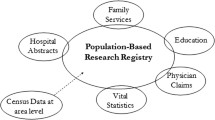Abstract
This paper investigates the effects of participation in gifted education programs, and offers several contributions to existing research. First, this paper studies the effects of high school programs, as opposed to the more commonly-studied elementary and middle school versions. Second, this paper considers impacts of gifted programs on later-in-life socioeconomic success, including college graduation and eventual employment, as opposed to short-run standardized test outcomes. Third, this paper uses sibling fixed effects, coupled with a recently-proposed decomposition method, as an identification approach. The main conclusion is that gifted programs tend to include students who possess traits that already correlate with later-in-life success. After controlling for those traits, gifted programs, per se, show little statistical relationship to later-in-life outcomes.
Similar content being viewed by others
References
Adelson JL, McCoach DB, Gavin MK (2012) Examining the effects of gifted programming in mathematics and reading using the ECLS-K. Gifted Child Quarterly 56:25–39
Arcidiacono P, Beauchamp A, Hull M, Sanders S (2015) Exploring the racial divide in education and the labor market through evidence from interracial families. J Hum Cap 9:198–238
Bhatt R (2011) A review of gifted and talented education in the United States. Education Finance and Policy 6:557–582
Bhatt R (2012) The impacts of gifted and talented education. Working Paper
Bui SA, Craig SG, Imberman SA (2014) Is gifted education a bright idea? Assessing the impact of gifted and talented programs on students. Am Econ J Econ Pol 6:30–62
Callahan C, Moon T, Oh S (2013) Status us high school gifted programs. University of Virginia, National Research Center on the Gifted and Talented
Card D, Giuliano L (2014) Does gifted education work? For which students? National Bureau of economic research, (no. w20453)
Cullen J, Jacob B, Levitt S (2006) The effect of school choice on participants: evidence from randomized lotteries. Econometrica 74:1191–1230
Davis B, Engberg J, Epple D, Sieg H, Zimmer R (2013) Bounding the impact of a gifted program on student retention using a modified regression discontinuity design. Annals of Economics and Statistics 111-112:10–34
Delcourt MA, Cornell DG, Goldberg MD (2007) Cognitive and affective learning outcomes of gifted elementary school students. Gifted Child Quarterly 51:359–381
Gelbach J (2016) When do covariates matter? And which ones, and how much? J Labor Econ 34:509–543
Ladd H, Walsh R (2002) Implementing value-added measures of school effectiveness: getting the incentives right. Econ Educ Rev 10:1–17
McClain MC, Pfeiffer S (2012) Identification of gifted students in the United States today: a look at state definitions, policies, and practices. J Appl Sch Psychol 28:59–88
Murphy PR (2009) Essays on gifted education's impact on student achievement. The Florida State University
Odden A, Picus LO, Archibald S, Goetz M, Mangan MT, Aportela A (2005) An evidenced-based approach to school finance adequacy in Wisconsin
Sass TR (2006) Charter schools and student achievement in Florida. Education Finance and Policy 1(1):91–122
Snyder TD, Dillow SA, Hoffman CM (2009) Digest of Education Statistics 2008. NCES 2009–020. National Center for Education Statistics, US Department of Education. Washington: Institute of Education Sciences
Todd P, Wolpin K (2003) On the specification and estimation of the production function for cognitive achievement. Economic Journal 113:F3–33
Todd P, Wolpin K (2007) The production of cognitive achievement in children: home, school, and racial test score gaps. J Hum Cap 1:91–136
Author information
Authors and Affiliations
Corresponding author
Ethics declarations
Funding
This paper received no external funding.
Conflict of Interest
The authors declare that they have no conflict of interest.
Rights and permissions
About this article
Cite this article
Welsch, D.M., Zimmer, D.M. Do High School Gifted Programs Lead to Later-in-Life Success?. J Labor Res 39, 201–218 (2018). https://doi.org/10.1007/s12122-017-9252-9
Published:
Issue Date:
DOI: https://doi.org/10.1007/s12122-017-9252-9




